- jp
- en
-
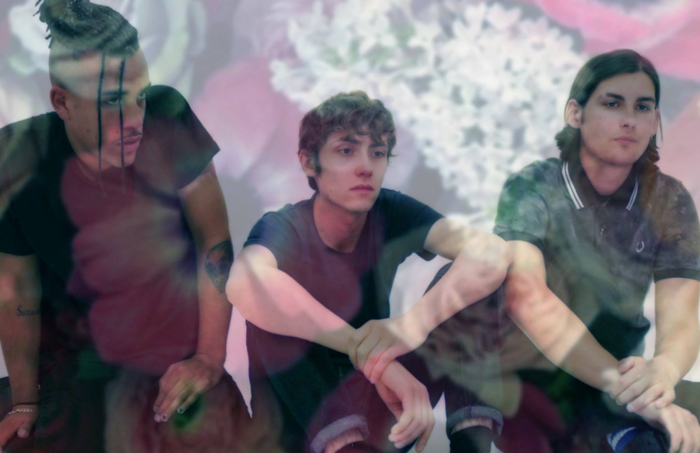
“― こんな事を言うと気取っていると思われるかもしれないけれど、意義があると思わされたんだよ。
Interview by Kazumichi Sato (Monchicon!) / Translation by Sumire Taya (Violet And Claire)
作品を生み出す意義があると信じることで僕は本気になれた。”
― 何がきっかけで日本の文化に興味を持ったのかな?どんな日本の文化に魅力を感じますか?
僕の両親はポーランド移民で、幼い頃からずっと母は僕と会話をする時にポーランド語を使っていて、母はちゃんとした形で英語を習ってこなかった事もあって今でも上手く話せないからポーランド語で会話をしているよ。だからそのポーランド語を使っていた背景もあって、周りの友達とは少し違う生活だったと思うんだ。学校ではアメリカの文化や伝統を勉強して吸収しようと努力する一方、家ではポーランド人の子供として育てられていたので、アイデンティティが少しずつ崩壊していった。大人になった今となってはその二つの違った「環境」を学べた事は運が良かったと思えるけれど、当時はその二つの世界のどちらとも繋がれてないという感情をいつも抱いていた。
日本のアニメやゲームなどマニアな文化がすぐに主流となり、僕もそれに夢中になったんだ。
ほとんどがとても幻想的で、非現実的なものであるにも関わらず、いろんなメディアを通して知る事が出来るこのカルチャーのおかげでやっと僕は自分の持っていたイメージやカルチャーと繋がる事が出来る様になったんだ。中学生になってアダムと出会って彼がスパルタローカルズやナンバーガールみたいな日本のバンドを教えてくれたんだ。それが僕にとって大きな転機になったんだ。日本の文化を全く新しい次元で知る事によってやっと僕は自分の感情を表現する術を知る事ができたからね。日本に行って幸せになる、というのは道理にかなった次のステップで、僕はすぐに決心したよ。
その後その決心は甘い考えだと気付けたけど、日本やその日本文化に対する興味や憧れは止まらずにどんどんと膨らんでいった。日本のものをもっと広く調べていくうちに、映画、イラスト、絵画、物作り、食べ物、生活、そして最終的に歴史に辿り着いたんだ。普段から歴史に関しては大きな関心があって、父は第二次世界大戦後すぐに生まれ、その時の様子や歴史の流れを変えた人々、一生消える事のない強烈な印象を与えられた事などを僕に教えてくれたんだ。
小さな頃からずっと歴史に名を残す事をしたいと思ってきて、僕にとってその手段が音楽だと信じてきた。ギリシャの作家ラフカディオ・ハーン(小泉八雲)が残した日本の昔話についての本が僕にとって入門書となり、日本の歴史を勉強して知る度にさらに魅了されていったんだ。
それから江戸時代に関する本や、明治時代の小説家、夏目漱石や石川啄木の作品を読み漁るようになった。1800年代の日本を読み解いていくにつれ、僕の関心は頂点に達し、アイデンティティのようなもに変化してき、その時代に作られた物語や作家と通じ合っている様に強く思えた。
芸術的感性、習慣や生き様が僕の奥底に存在する感情と共鳴するようで、僕は日本を旅して自分の目でそれを確かめるべきだと強く感じる事が出来た。
― ここ最近旅行で日本に行ったみたいだけど、どんな体験をしたのかな?印象に残った場所はありますか?
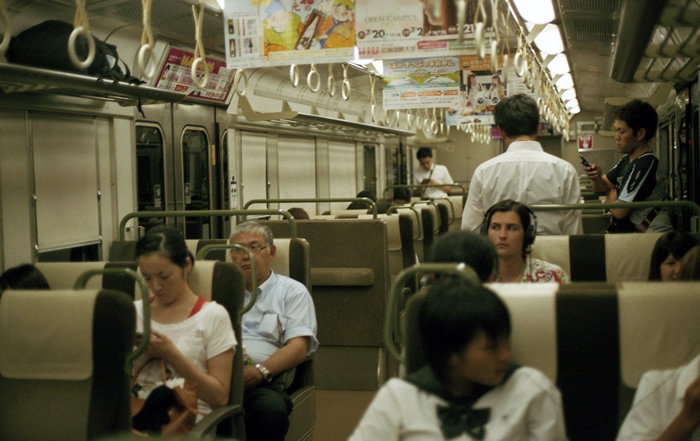 うん。2013年の夏に一ヶ月、彼女と一緒に日本を旅したんだ。日本を訪れる前にヨーロッパにも行って、その旅行のおかげで今までの自分のこと、そしてこれからどんな人間になりたいのか、今まで自分の中で処理出来なかった疑問に答えを出してくれる有意義な体験になったんだ。
うん。2013年の夏に一ヶ月、彼女と一緒に日本を旅したんだ。日本を訪れる前にヨーロッパにも行って、その旅行のおかげで今までの自分のこと、そしてこれからどんな人間になりたいのか、今まで自分の中で処理出来なかった疑問に答えを出してくれる有意義な体験になったんだ。
彼女と僕は大阪に降り立ち、すぐに電車に飛び乗って都心部へと向かった。長い間ずっと夢見てきたその場所に確かにやってきたことが信じられない、電車の中でずっとそんな事を考えていた。
僕にとっては全てが未知の世界だったけれど、何故か居心地が良く穏やかな気持ちになった。しかしそれも束の間、大阪で過ごした数日は日本で初めて過ごす体験だったのもあって、どんどんと辛い気分になっていったんだ。今までの人生の中でこれほど疎外感を感じたのは初めての体験だった。言語が理解できなければ、その国を訪れても最終的には慣習などを理解するのは不可能だと言う事を痛感したよ。
しかし、大阪を離れ広島を訪れると状況はがらりと変わった。広島はとても静かで平和な場所だと感じた。写真で見て憧れていた三鷹という小さな村でその美しさを遂に自分の目で見る事が出来たんだ。
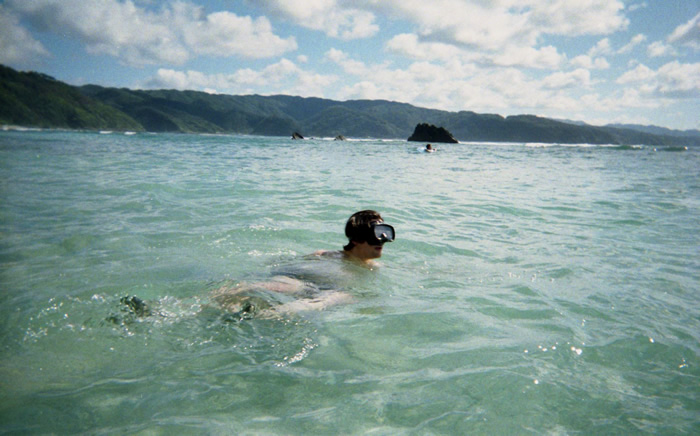 そこから南に下って福岡で数日過ごし、友人のナカシマジュリさんがいる奄美大島行きの飛行機に乗るために鹿児島へと移動した。奄美で過ごした時間はこの作品を生み出す過程においてとても貴重なものだった。その状況を言葉で要約するのは難しいけれど、出会った友人、その友人との会話は心に深く刻まれ、そこでの思い出は多大な影響を与えてくれたんだ。離れ小島で会話が成り立つ人は二、三人しかいなかったにも関わらず、故郷に帰ってきたような、穏やかで生き生きとした気分になれたし、しっくりきたよ。
そこから南に下って福岡で数日過ごし、友人のナカシマジュリさんがいる奄美大島行きの飛行機に乗るために鹿児島へと移動した。奄美で過ごした時間はこの作品を生み出す過程においてとても貴重なものだった。その状況を言葉で要約するのは難しいけれど、出会った友人、その友人との会話は心に深く刻まれ、そこでの思い出は多大な影響を与えてくれたんだ。離れ小島で会話が成り立つ人は二、三人しかいなかったにも関わらず、故郷に帰ってきたような、穏やかで生き生きとした気分になれたし、しっくりきたよ。
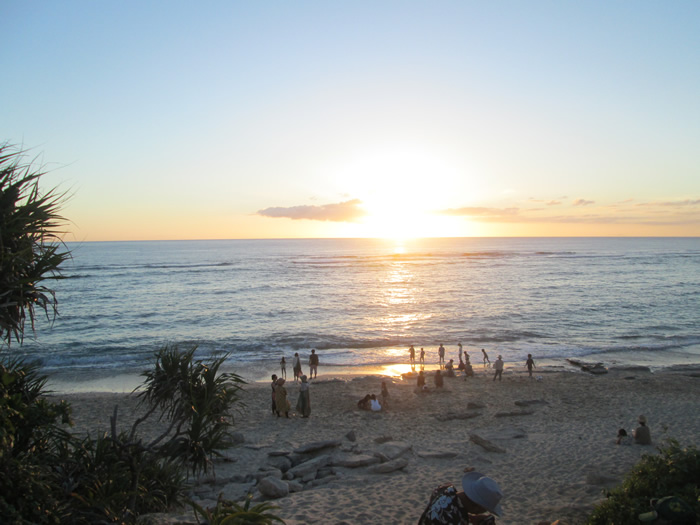 一度訪れたら二度と離れたくないと思ってしまうほど、奄美は驚くべき美しい島なんだ。その情景や体験を通して、そこで絆を作った友人、そして島全体と繋がっていると感じる事が出来たよ。言葉の違う人々と信頼関係を結ぶ事でより深く世界と繋がっていると思えるし、自分が生きてると強く感じる事が出来るんだ。
一度訪れたら二度と離れたくないと思ってしまうほど、奄美は驚くべき美しい島なんだ。その情景や体験を通して、そこで絆を作った友人、そして島全体と繋がっていると感じる事が出来たよ。言葉の違う人々と信頼関係を結ぶ事でより深く世界と繋がっていると思えるし、自分が生きてると強く感じる事が出来るんだ。
奄美を後にして大阪に戻り、Fastcut Recordsのナオキとその家族と時間を過ごし、一緒にご飯を食べたり、飲んだりして本当に素晴らしい時間だったよ。Wallflowerのマサミとハルも参加してくれたんだ。大阪を拠点にして、京都のお寺や奈良にも足を伸ばした。旅の終わりは東京だったけれど、その数日間は病気で台無しにしてしまった。長旅で身体が弱っていたんだ。それでも大のインディー・ポップ・ファンで才能にあふれるキムラレイコとは楽しい時間を過ごせたよ。この日本への旅行は自分探しをしていた自分にとってとても重要なものになったんだ。
その旅の後、僕は音楽をやるエネルギーが自分の中に残っているか分からなかった。でも旅をした事で今まで知っていた世界と全く違う世界を知る事が出来たんだ。人間の想像力の可能性、歴史に刻んできたものの重要さに感銘を受け、僕は音楽やアートを作り続ける事が自分の使命で、歴史に何か重要な物を残さなければと気付かされた。こんな事を言うと気取っていると思われるかもしれないけれど、意義があると思わされたんだよ。作品を生み出す意義があると信じることで僕は本気になれた。
― 『ヘヴン』は日本の江戸時代に起こった悲劇をテーマにしたコンセプト・アルバムで、アルバムの為に書かれた物語はノンフィクションの物語から由来しているんですよね?この物語はどのようにして生まれてきたのですか?どんなものから影響やインスピレーションを受けましたか?日本の小説や映画からの影響でしょうか?
コンセプト・アルバムを作ろうという計画は最初のEP 『regret, love, guilt, dreams』の録音している頃からずっとあって、映画のシーンの様な視覚的に訴えてくる音楽が作りたいと思い続けてきた。僕の最終ゴール地点は映画音楽やゲームの音楽を制作する事なんだ。
ある物語の為にサウンドトラックを創作するのは、音楽にそれぞれに違った感情を宿らせる事が必要とされるんだ。ザ・ビリンダ・ブッチャーズを始めたばかりの頃に最初のアルバムはサウンドトラック的なものにしようと考えていた。自分たちで作り出した物語を元に作品の随所でナレーションが入って内容を補足する、そんなコンセプト・アルバムが作りたかったんだ。2枚目のEP『goodbyes』の制作が終わり、その時がやって来たと思った。物語を書く為の時代背景など調べ始め、それと同時期にアニメ『サムライチャンプルー』を沢山見て研究し、19世紀の日本の文学の知識を増やしていく内にラフカディオ・ハーンの書物に出会った。
その中でも三味線奏者の旅芸人がハーンの住む家に訪れて弾いたこの歌は僕をとりわけ惹き付けたんだ。
その女性奏者は愛し合っている恋人同士が一緒になれない事を苦に心中する物語を歌ったんだ。「The Lover’s Suicide」はその話から影響を受けてを作られたものだよ。
そして、そこから作品のコンセプトを立ち上げていき、江戸後期の時代に愛し合っている二人の若い男女が一緒になれない悲劇が浮かんで来た。約2年くらい前かな、このアルバムに収録する為にアダムと僕はデモを数曲作った。研究を続ける内に物語の骨組みを組むのが最優先で、このまま曲を作り続けたら後に困難になる事に気が付き、アルバムを作る過程を逆行する事に決めた。
「二人の恋はとある(未だに具体的なものは定めていない)理由によって阻まれる。それを苦に二人は現実から逃げる事を決意する」この主旨は初めに作った数曲を軸に固め、作曲を進めると同時に物語も進展させていった。
若い二人が恋に落ち、しかし男性は戦争に徴兵され亡くなってしまう。あの世で彼とまた一緒になれる様に彼女は自ら命を落とす。元々はそんな物語だった。自分たちで作ったコンセプト、曲に込められた感情、既に書いた歌詞が交差しないという問題が発生して手に負えなくなっていったんだ。
最終的にミッシェル・ヨーンと僕はすでに書いた曲に物語をすり合わせていくよりも、組み立てた物語の為に曲を書く事に決めたよ。その作業はとても困難で、解決するまでに数ヶ月はかかった。作品のトーンや変化を物語とすり合わせるために日記をつけようというアイデアが浮かんで来た。
忠誠心や信仰などモラルに対する概念が現代とは全く違う時代に、愛を追求する人々を描きたいと思っていたし、江戸時代に普及したその愛の形を音楽と結びつけるべきだと思い付いたんだ。
物語をもっと手を加えて違ったものにしたい気持ちもあったけれど、既に「サウンドトラック」として曲を完成させていたので、それが実現する事が出来ない犠牲も受け入れなければいけなかった。
ウメの物語で注目すべきコンセプトや論題は個人の「ヘヴン=天国」を私たち、そして社会がどう考えるかと言うことなんだ。実は僕の腹違いの兄弟は僕が幼い頃に亡くなり、母の信仰はより深くなっていった。幼い時期に教会で過ごした時間が長いのはその母の経験故なんだよ。その一方で父は今までどんな宗教を信じているか教えてくれた事がないし、未だに謎なんだ。宗教に対して真逆の両親のおかげでそういった宗教やスピリチュアルな事に対して色んな視点を持つ事が出来たよ。神霊的なものや信仰を異世界のものと捉える必要はないという導きも得た。この日常の中でそれぞれの「ヘヴン」を探し出す事、それを共有するのは恋人でも家族でも友人でも、職場の人だって構わないんだ。その時に気付き始めた自分なりの忠誠心や信仰が僕の幸せを裏付けるものだと思う。
この作品の物語の中でウメは宿命として希望を失っていた。しかし彼女は詩人との友情の中で感情を解放させる事を知り、幸福とは置かれている状況ではなく、幸せでありたいと望む事、そしてつまるところは自分自身で苦しみから逃れる行動をとる事で幸せになれると理解した。そして彼女は恋人と逃亡する事でやっと幸せを見出し、運命を受け入れる事が出き、自分の愛する人が彼女の忠誠心、そして自分の宿命の為に殺されたのを知って永遠の自由を手にする事が出来たんだ。
彼女の幸福はその恋人との約束に由来し、その約束を最後まで貫く事こそが忠誠心だと信じていた。
そんな彼女にとってみれば、この世界に彼女の居場所は無く、真の幸せは彼女自身の中にあるという事に彼女は気付く事が出来た。そしてこの物語には明白にしなければならないメッセージが込められている。儀式や時折起こっていた心中など日本の歴史上、無視することのできない事実から構想を得ているんだ。この物語はウメのとった行動を賞賛するものではなく、空想の物語として楽しんで欲しい。自分の精神を幸せにする物は一体何なのか探る事が見つけるべきだという深いメッセージが重要だし、精神的な強さや勇敢さがあってこそ幸福を追求出来るから、ただチャンスを待っているだけじゃ駄目だと思うんだ。
― 実際に雨や風の音を録音して使用しているみたいだけど、この曲のタイトルに由来した場所で録音したのかな?
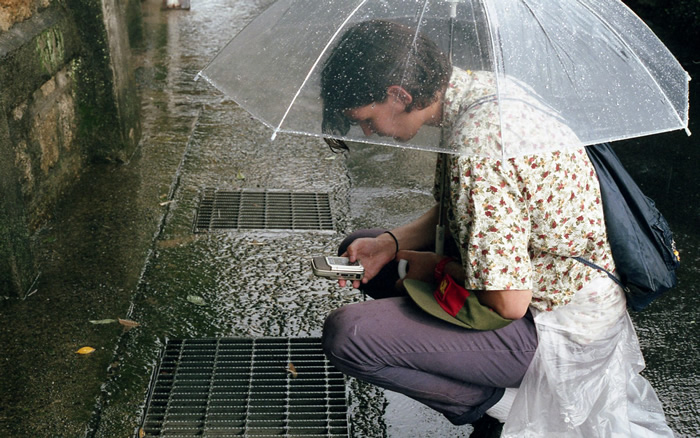 The Radio Dept.の影響でその由来の場所で録音する事が好きになったんだ。物語を音で再現するには、雰囲気たっぷりな所で録音されたこういうアンビエントなサウンドが役立つ事も理解しているしね。「Old Style Amami」には奄美で録音した鳥の声を加えたり、「New Style Akashi」では明石で録った雨の音を入れたり、タイトルに由来する場所をイメージした音を曲に入れているのは事実だけれど、ポーランドやドイツで録った音も入ってるんだ。「The River Sumida」で使われている子供が歌っているパートは大阪の小学校で録ったもので、バルト海の風の音はポーランドで録ったものなんだ。
The Radio Dept.の影響でその由来の場所で録音する事が好きになったんだ。物語を音で再現するには、雰囲気たっぷりな所で録音されたこういうアンビエントなサウンドが役立つ事も理解しているしね。「Old Style Amami」には奄美で録音した鳥の声を加えたり、「New Style Akashi」では明石で録った雨の音を入れたり、タイトルに由来する場所をイメージした音を曲に入れているのは事実だけれど、ポーランドやドイツで録った音も入ってるんだ。「The River Sumida」で使われている子供が歌っているパートは大阪の小学校で録ったもので、バルト海の風の音はポーランドで録ったものなんだ。
― このアルバムをレコーディングしてた時の状況を教えてくれる?以前と何か違いがあったかな?プロデューサーは起用したのかな?
この作品のレコーディングでは以前とはいくつか違う段階を経て完成させられたんだ。『goodbyes』をレコーディング中にデモを書き始めた。通常ならばアダムと僕はお互いに曲を書いて最終的な所で意見のすりあわせをして二人の作品に仕上げるんだけど、今回は歌詞や曲の構成を決める段階から二人でやる事にしたんだ。アルバムのレコーディングに入る段階で親友であり、ザ・ビリンダ・ブッチャーズのプロデューサーであるルーカス・アンテスタイナーがシアトルに飛んできてくれて、ライアンも加わり、そのデモを作品に仕上げる作業に取りかかった。ドラムセットを組み立て、問題点を解決しながら一貫した流れを作り出した。
僕にとって今までで一番共同作業だと思える体験だった。三人それぞれが良い演奏が出来たのもあるし、徹夜してデモを曲に仕上げていった。僕らはインディーのバンドだし、予算も少ないからギター、シンセサイザー、ドラムを駆使するしかないんだ。もしプロのエンジニアが僕らのレコーディング風景を見たらびっくりして身がすくむんじゃないかな(笑)。でも予算が少なくても良いものは作れる。僕らはのサウンドはデジタルで処理するのが前提で、深く拡張させるからスタジオで良質の音色でレコーディングする必要は無いからね。2枚のシングルを出してルーカスと僕は自分たちを制しながら録音作業に取りかかっていたけれど、やっとお互いがどう動いたら一番最適か理解出来る様になってきたよ。自分たちの可能性を理解しているし、ルーカスは適切な方法や僕らと違ったアイデアを持ち寄ってくれることも分かっているからね。実のところルーカスは音楽的に全く別ジャンルの人間だったんだ。でも今はこれ以上にないほど彼は音楽を勉強して、僕がどういった音作りをしたいのか、そのアイデアの元ネタもすぐに分かる様になったから話が早いんだ。録音作業がほぼ終わり、ミックス作業にはいった段階で僕らのやり方が正解だって確信が持てた。その作品に込められた物語、曲や制作過程、研究を積み重ねてきたおかげで深みのある作品になっていった。この作品の制作プロジェクトが自分たちの容量を越えていたにも関わらず、実現してとても清々しい気分だった。
― このアルバムにアンビエントなインストやダークな雰囲気を持った曲やポップな曲など様々な側面があり、今までのシングルなどと比較すると、大きな飛躍を感じました。
この作品を作る時にどんなサウンドや雰囲気にしようと考えてましたか?
まさにそうだね。作品の制作が進んでいくにつれ、日々変わっていくムードに合うように、僕らはそれぞれ違ったスタイルやトーンを曲に込めていったんだ。作品に多様性を持たせる事で聴く人の状況や雰囲気に合わせて選択する自由を与えられるようにしたかったんだ。結局のところ、このレコードがそれぞれ聴く人の心の日記の様な存在になったら嬉しいんだけど。ウメが詩人に出会い、最終的に「The River Sumida」で彼女が溺れ死ぬ物語のテーマが一番始めの曲に込められているんだ。
― 『Heaven』でナレーションをしているナカシマジュリさんの事を教えてくれる?
ジュリさんは近しい友人で、知り合ってから随分経つよ。彼女がアメリカに訪れたときに知り合って、それからはインターネットを通じて喋ったりしている内にお互いにアートや詩に対する深い認識がある事に気が付いたんだ。彼女がこっちに滞在している間にそれほど長時間一緒に過ごせた訳じゃないけれど、芸術的な所で確実に僕らは通じ合っていると思えたよ。ダナと二人で日本を訪れ、奄美にいる彼女の所で飲みながら話をする機会があったんだ。そこで僕らの繋がりやアートに対する関心の深さを再認識させられたんだ。
彼女が詩を朗読し、それを僕が録音した。僕らは酔っぱらいながら、一緒に何かを世界に何かを残そうと決めたんだ。アメリカに戻ってレコーディングを始めるとその「ウメ」のキャラクターにジュリとの共通点が幾つも発見する事が出来て、彼女がウメとして朗読した事がとても自然な出来事のように思えてきたよ。
― 「Tanka」では日本のLampというバンドと一緒に演奏しているけれど、このコラボレーションはどんなきっかけで実現したのかな?Lampのメンバーとは古くからの知り合いなのかな?
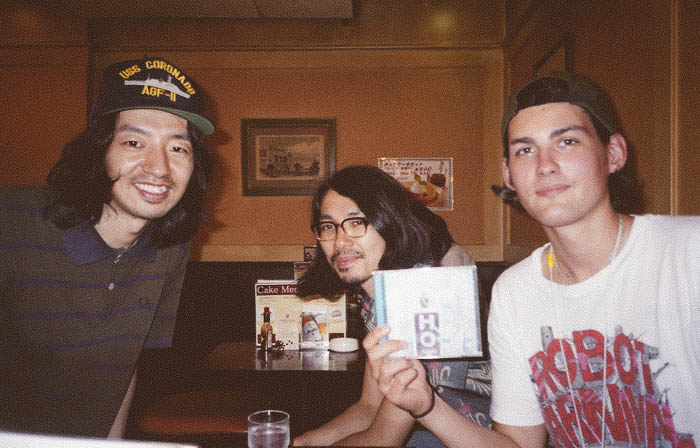
Lampの事は大分前から知っていて、彼らの音楽に本当に憧れていたんだ。言い過ぎかもしれないけれど神様みたいに神聖な存在なんだ。彼らが作り出している音楽は歴史的にも重要なものだと思う。彼らの音楽を初めて知った時、僕にとってそれは苦行でしかなかった。あまりにも美しく、完璧で僕をとても悲しませたよ。だから長い間、故意的に僕は彼らの音楽を聴く事を避けてきた。
しっかりと腰をすえて彼らの音楽を聴くまでに一年はかかったよ。きっかけは覚えてないけれど、アダムがタイヨウさんに連絡をとってそれから頻繁に意見を交換するようになり、日本に行った際には連絡を取り合って絶対に彼と過ごす時間を作ろうと心に誓ったよ。
運良く東京にいる時に会う事が出来て、レコードショップを巡ったり夕飯を供に出来て夢が叶って、死ぬまでにやりたい事リストの一つをクリアできた気分だったね。夕飯の後にカフェに向かっているところでLampの男性ヴォーカルであるナガイさんに会った。その時も嬉しくて圧倒されたね。本当に夢みたいだったよ。その瞬間を言葉で表現するのは難しいけど、感情で僕らは繋がっていた。そこにある物全てを片付け、カメラを置き、彼らと一緒にいる事で出来るだけ沢山の事を吸収しようと思った。言語の壁があるからこそ、余計に感情だから繋がれる部分が合ったんだと思う。旅から戻ると無性に彼らと作品を作りたい気持ちになったんだ。誰かを作品に起用することに慣れていないから、スタジオセッションみたいな彼らのありのままの音楽を作品の中で使うのが良いんじゃないかって結論が出たよ。旅行に行く直前に「Tanka」の作曲をして、旅の最中にずっとデモを聴き続けていた。まだ歌詞はなくてギターとドラムだけだったけど、僕やバンドにとってこの曲は他の曲以上に重要な曲になるはずだと感じていた。ウメが恋人に永遠の別れを告げるパートが含まれているこの曲は様式とかではなく、曲に込められた切なくて厳粛なメッセージがアルバムそしてザ・ビリンダ・ブッチャーズを象徴していると僕は考えているよ。
ビートは激しく、フルートはメランコリックで優しく響き、曲に込められたメッセージは率直で確かなものになっていった。曲のヴァイブやスタイルはLampが持つバンドの要素とは真逆のものでありながらも、とても素晴らしい作品になったと思う。歌詞を日本語に訳して彼らに送って、彼らがコーラスを送ってきてくれた。特に何も指示をしたりしなかったけれど、完璧にはまっていたね。
― 「Tanka」の冒頭で日本の昔からあるカードゲーム、カルタに書かれていた「短歌」を使っているけれど、なぜこの短歌を選んだのかな?
この詩はLampのカオリさんが選んでくれて、彼女が凄い昔に買った本の白紙のページに書かれていたもので、それが強烈な印象に残っていたんだ。彼女がコーラスで参加してくれた時にその「短歌」というタイトルでその詩の事を思い出してくれて、いとも簡単にこのコラボレーションが実現したよ。自然にパズルのピースがはまったんだ。
― Keep Shelly In Athensにいたサラとハリエット・ブラウンもこの作品に参加しているけど、そのきっかけを教えてくれるかな?
ハリエット・ブラウンは偶然僕の同居人になって、今では仲良しのアーロン・ヴァレンズエラの偽名で、長い友好関係の中でお互い励まし合いながら音楽を作ったり、自分たちがやっている音楽のジャンルでの限界の壁を超えるために刺激を与えあってきたんだ。このレコードの中で表現されている感情的な部分で彼は重要な役割を担ってくれたんだ。ドリーム・ポップやシューゲイズの作品で彼みたいなヴォーカルが使われる事ってあまりないし、その通例に反抗する気持ちが自然とわき起こってきたよ。そして二人で「Heaven Holds A Place」の最後の部分を書き上げたんだ。
サラ・Pには「Golden House」で参加してもらったんだ。たしか二年前に書いた曲で、ヴォーカルのメロディ、曲に込める感情がはっきりと確立しない厄介な曲で、ピッチを上げたり、下げてみたりしたけれど解決策にはならなくて、とりあえず寝かせることにして、一年以上その存在を忘れていたよ。ヴォーカルのところの問題はとりあえず考えないようにして、インストの曲として再びレコーディングを再開したんだ。ゲストボーカルを入れたい、ラップのMCがもしかしたら合うんじゃないか?そんなアイデアが初めにあって、自分たちでボーカルを録ろうとしたけれど上手くいかず途方に暮れたよ。そこで女性ヴォーカルを探そうということになって、サラがすぐに候補に浮かんだんだ。しかし、そのアイデアが浮かんだのが彼女がKeep Shelly In Athensから脱退するニュース直後だったから、僕とアダムは彼女が音楽自体をやめてしまったんじゃないかと心配した。連絡を取り、歌う事を快諾してくれて、彼女が音楽自体をやめた訳じゃないと知ってほっとしたよ。 彼女はこの歌に込められた物語の感情を歌詞から読み取ってくれて、ウメが葛藤する瞬間の感情を歌で完璧に表現してくれたんだ。
― アメリカでこの『ヘヴン』をリリースしたレーベル、Orchid Tapes(オーキッド・テープス)について教えてくれるかな?彼らとはどうやって知り合ったのかな?
Orchid Tapesのオーナーの一人、ウォレンとは『regret, love, guilt, dreams』以来の知り合いで、彼がそのシングルを気に入ってくれて話す様になったんだ。
ブライアンはもう一人のオーナーで、僕と一緒にZOOM LENSを運営しているギャレットと仲が良くて、知り合ってからずっと何か一緒にやろうと話してきたけれど、なかなか実現しなかった。
『ヘヴン』のレコーディングも最終段階になって、ウォレンと僕は今の音楽産業のこと、このジャンルではレコードをリリースする時にミュージシャンがシャイで感情的になりやすい、そんな話もしたよ。
僕とウォレンは音楽を始めた時に苦労した経験があって、その似た境遇を通じて仲良くなり、お互いのレコードを見せ合うことでその絆は強くなった。『ヘヴン』は完成するまでに3年もかかってしまったけれど、ウォレンがやっているFoxes in Fictionの『Ontario Gothic』は同じ時期に作り始めて、完成までに更に時間がかかりそうなんだ。制作の経過や、その作品に込められたストーリーの深さの為にどんな努力をしているのか、その為には時間が必要だという話を沢山してきた。その会話を通じて築き上げた作品に自信を持つ事が出来る様になったし、『ヘヴン』がOrchid Tapesからリリースされるのは宿命だったと思うよ。
― 『ヘヴン』のジャケットのイラストは辻恵さんによるものだと思うのですが、彼女の魅力とは何でしょうか?彼女の作品とアメリカのイラストレーターの作品との違いは何だと思いますか?
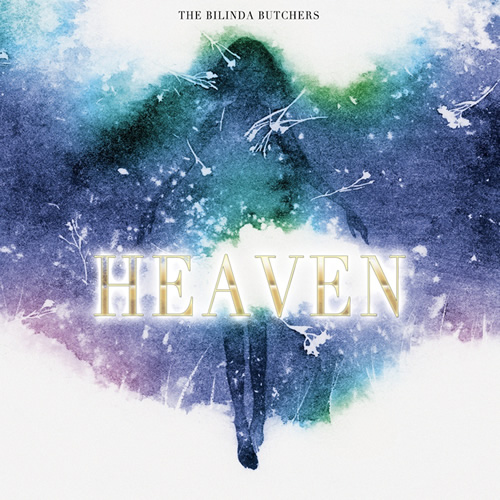 一つの作品を仕上げる中でジャケットの内容を決めるのは特に難しいと思う。
一つの作品を仕上げる中でジャケットの内容を決めるのは特に難しいと思う。
様々な感情やムードが音楽や物語の中には包括されていて、それを視覚的に表現するジャケットって凄く難しいと思う。(『ヘヴン』の物語を一緒に創作してくれた視覚芸術家の)ミッシェル・ヨーンがいくつかのコンセプトでアートワークを提案してくれたんだけど、考えた結果とてもシンプルなものにしようという事になって、最初の試作は「HEAVEN」という文字を白のバックにエンボスで浮き上がらせようという案が出た。良い案だと思えたけれど結局はふさわしくないと却下になった。ジャケットのアートワークのアイデアを思いつく限り並べ他のアーティストとに依頼するべきかとさえ考えた。しかしその努力も報われず、僕は部屋に鍵をかけて閉じこもって、作品に完璧に合うアートワークに相応しいものとは何なのか答えを出そうと躍起になった。色んなウェブサイトを眺めてアートワークのアイデアを考えている内に恵のさんの作品に辿り着いた。彼女の作品を見てすぐに完璧だと思ったよ。そして今まで探し求めていたものが彼女の作品を見て正解が出た気がしたんだ。彼女の制作してくれたアートワークは神秘的で夢の中にいるようで、『ヘヴン』の温度感とぴったりはまった。ウメと思われる少女が霧の様なものを纏い、彼女に向かって花が投げられているそのアートワークは彼女がやっと終着点に着けた事、濁りが一切無い清澄な彼女を表現しているんだ。
恵さんの作品を知った時、彼女の作品がとても日本人っぽいとは思わず、ヨーロッパ発の様々な様式を組み合わせたようにも思えた。その一方でアニメのような色々な日本の現代アートの要素も混ざっている様にも思えた。現代、古典など様々なものからヒントを得ながらも完璧にオリジナルな作品を彼女は生み出していた。新世代エヴァンゲリオンやファイナルファンタジーの大ファンの僕にとって、彼女の作品からその偶像的なイメージを連想出来る事が嬉しかったし、そのうえとてもオリジナルなんだ。彼女の作品に宿る魂が作品の音楽と強く繋がっている様に思えたよ。
僕らの憧れのバンド達から沢山の影響を受けながらも、ザ・ビリンダ・ブッチャーズとして新しいものを創造することにずっと力を入れてきたんだ。特にこの作品では新しくてオリジナルな作品を生み出す事を強く意識した。恵さんの作品みたいにその努力が報われているのかは確かじゃないけどね(笑)。
― このレコードをリリースした後はどんな計画を立てていますか?
ザ・ビリンダ・ブッチャーズというバンドを意味付けるそんな意義のある大作を作りたいとバンドを始めたときから考えていたんだ。『ヘヴン』はまさにその作品で、完成してしまったんだ。だからこれからもっと作品を発表するとは言い難いね。未来に何が待ち構えているか分からないから明言は出来ないけれど、僕らはベストを尽くしたし、特別な作品を作る事が出来たと思うよ。
-

“I don’t mean this in a pretentious way but only in a way that made me feel that I had purpose. It helped me feel that there was something worth working hard for.”
Interview by Kazumichi Sato (Monchicon!)
-First off, what prompted your interest in Japanese culture? What about Japanese culture attracted you?
My parents are both Polish immigrants, so growing up my mom only spoke to me in Polish. She never really learned how to speak English very well so still to this day we speak to each other in Polish. So growing up my home life was a bit different from my friends because of the Polish background. I would go to school to learn and absorb the culture and traditions of America while in my household I was raised as a Polish child, which created a bit of an identity crisis for me. Now, being older I feel really blessed to have been able to absorb two different “worlds” but at the time I felt a sort of disconnect emotionally with both of those worlds. I really got into the counter culture which very quickly became mainstream: Anime and video games coming from Japan. And from there I began to feel connected to the images and “culture” that were presented to me through these different types of media, although most of it was very fantastic and unreal. Later when I met Adam in middle school, he introduced me to a ton of Japanese bands like Sparta Locals and Number Girl which was a huge turning point for me because I was finally able to expand on my feelings and find a new and different dimension in Japanese culture. I felt determined at this point that the only logical step was to go to Japan and be happy (haha). Later, I realized those feelings were naïve, but my admiration and interest for Japan and the culture never ceased, and only kept growing. I began looking into a wider variety of things from Japan; film, illustration, painting, crafts, food, way of life and eventually history. I’ve always been really interested in history in general. My father, who grew up right after the second world war would always tell me about events and people who changed the course of history and made a lasting impression forever. Making a mark in history was something that I was really determined to do from an early age and I thought making music was a way to do that.
So when I started to read more about Japanese history I was fascinated. My introduction actually began with the Greek author Lafcadio Hearn and his many books on Japanese folk tales. And from there I began reading more and more about the Edo period and beyond, as well as authors from the beginning of the Meiji era like Natsume Soseki and Takuboku Ishikawa. Reading about Japan in the 1800s was where my interest peaked and turned to a sort of identity. I felt really connected to the authors and stories that took place in those times. The artistic interpretation, the customs, the way of life, it all seemed to resonate with something deep inside of me. That was when I knew that I had to travel through Japan and see it with my own eyes.
-You did some traveling in Japan recently. What was your experience like and what was your favorite place?
 Yes, I travelled through Japan for one month in the Summer of 2013 with my girlfriend, and before Japan we were traveling through Europe. The whole trip was very meaningful and helped me work through a lot of unresolved emotions with who I was and what I wanted to do and be in the future. My girlfriend and I flew into Osaka and immediately hopped on a train to the city center. My first impression while riding the train was that I couldn’t believe that I had actually made it and was there, living out a life long dream. Everything seemed strangely unfamiliar but at the same time I felt comfortable and calm. We spent a couple of days in Osaka and overall those first few days became more and more difficult. I actually began to feel like an outsider for the first time in my life. Being somewhere where I didn’t understand the language and ultimately didn’t understand the customs or way of life. But as soon as we left Osaka and got to Hiroshima things quickly changed. Hiroshima was really quiet and peaceful and we finally got a chance to discover some of the countryside and the beauty that we had admired from photographs in the small village of Mitaka.
Yes, I travelled through Japan for one month in the Summer of 2013 with my girlfriend, and before Japan we were traveling through Europe. The whole trip was very meaningful and helped me work through a lot of unresolved emotions with who I was and what I wanted to do and be in the future. My girlfriend and I flew into Osaka and immediately hopped on a train to the city center. My first impression while riding the train was that I couldn’t believe that I had actually made it and was there, living out a life long dream. Everything seemed strangely unfamiliar but at the same time I felt comfortable and calm. We spent a couple of days in Osaka and overall those first few days became more and more difficult. I actually began to feel like an outsider for the first time in my life. Being somewhere where I didn’t understand the language and ultimately didn’t understand the customs or way of life. But as soon as we left Osaka and got to Hiroshima things quickly changed. Hiroshima was really quiet and peaceful and we finally got a chance to discover some of the countryside and the beauty that we had admired from photographs in the small village of Mitaka.

From their we travelled further down south to Fukuoka for a few days and then onto Kagoshima where we took a plane to Amami to visit our friend Juri Nakashima. Spending time in Amami was a really important for me as well as for the progression of this record. The people I met and the memories were a huge influence. To try to sum it up in only words is difficult. A lot of it was imprinted emotionally with the friends that I met and the conversations we had. Somehow in this distant far off island where I could only communicate with two or three people, I felt at home, comfortable and alive. I felt right.

Amami is a tremendously beautiful island and I think anyone who spent more than a day there could feel like they never wanted to leave, but beyond the scenery and my activities there I felt connected to the whole island and the friends I met and created bonds with. And when you can feel the trust and understanding of someone who you can’t actually have a conversation with you begin to feel a deeper connection to the world. You feel very human.
Once we left Amami we travelled back to Osaka to spend time with Naoki of Fastcut Records and his family. We ate and drank and had a great time. We also got together with Masami and Haru from Wallflower. From Osaka we stayed in a temple in Kyoto for several days and travelled to Nara. And on from there we ended our trip in Tokyo. Our last few days in Tokyo were a bit difficult because we both became ill. Traveling for such a long time had made us very weak. But we got to spend some time with Ray Kimura, the very talented artist and mega indie pop fan as well as some new friends. Our whole trip in Japan was extremely important, helping me identify who I am and what I want to be. I was really unsure if I still had the energy and will within me to continue making music at all. But traveling helped me see a different side to the world. What human beings are capable of creating and how we can all make an imprint in history. I decided that it was my duty to continue creating music and art to leave something of importance in history. And I don’t mean this in a pretentious way but only in a way that made me feel that I had purpose. It helped me feel that there was something worth working hard for.
-Heaven is a concept album based on a tragedy that takes place during the Edo period in Japan. The story written for the album is written as Non-Fiction. How was this story created? What were your inspirations and influences? Are any from Japanese novels or films?
The idea to do a concept album came a long long time ago, I think maybe during the time we were recording our first EP “regret, love, guilt, dreams.” Our idea was to make music that stemmed from a visual aid, like a scene in a movie. My ultimate goal always was to create music for film or video games. Creating a soundtrack for a story that called for different feelings in the music. So from very early on I knew that The Bilinda Butchers first album would be a soundtrack, a concept record based on a story that we would write with narration across the record that pushed the story along. When we finished our second EP “goodbyes” I knew it was time to start doing research and find the setting and tone for this story. At the time I was watching Samurai Champloo a lot and just beginning my brush with 19th century Japanese literature when I discovered the stories of Lafcadio Hearn. There was one story that stood out to me that was about a traveling shamisen player that stopped at Hearn’s home to play. She sang a song of two lovers who were unable to be together so they decided to perform a double suicide. This story inspired me to write the song “The Lovers’ Suicide.” This is where the concept began to develop. A story about two young lovers that cannot be together, set in the late Edo period.
That was maybe about two years ago now. When we started Adam and I had already demoed a few tracks that we were sure should appear on the record. And as we continued doing research and figuring out the best way to lay out the story we continued to write songs which proved to be a huge problem later on. The whole process of actually creating this record as it is presented was actually completely backwards. We started with a couple of tracks and then developed a very general idea: two lovers that cannot be together (for a reason that we still had not figured out) that decide to run away. And then as we wrote more music we developed more of the story. Originally the story was to be about a young couple who fall in love when the man is called to war. Later he is killed and the young woman decides to kill herself to be with him again. But with each concept that we created more problems presented themselves due to the vibe of the tracks and already finished lyrics.So in the end Michelle Yoon and I actually ended up fitting the story that we wrote into the record rather than write tracks for the story. It was very very difficult and took several months to figure out the best way to make a narrative that fit with the tone and variations of the record which is where the idea of creating a diary came to be. We wanted to present this really massive quest for love while presenting a different view on the moral subjects of loyalty and faith than they are presented today. These ideals were prevalent in the Edo period and we wanted to be able to present those ideas paired with something artistic like music. There were a few things I would have liked to create in the story differently, but given our limited space to work alongside an already finished “soundtrack” we made several sacrifices.
The concept and question in focus here with Ume’s story was what we as a society consider our personal Heaven to be. My step brother passed away when I was very young and from then on my mother became very devote in her Christian faith and I spent my early years growing up in the church because of that. My father on the other hand was never openly religious in any way and still to this day I’m not sure where he stands. But having those contrasts in my life gave me a mixed perspective on spirituality. Eventually I came to the conclusion that my concept of faith and spirituality did not have to be otherworldly. We all find out personal “Heaven” in our every day lives, whether it be in the love you share with your partner, family, friends or even your work. My faith and loyalty I began to find was rooted in things that made me happy in my life.
So in the story, Ume is is at a loss of hope because of the life she was fated to, but when she finds some emotional freedom in her friendship with the poet she understands that her happiness is not determined by her situation but by her desire and ultimately her actions to free herself from torment. When she is able to escape with her lover she finally feels in charge of her happiness and her fate. And later when she finds that he has been killed it is her loyalty and faith that ultimately set her free. Her happiness was stemmed from a promise that she made and in loyalty she acknowledges that promise to the end. In her case this world was not a place for her but she discovered where true happiness lies, within herself.
And there is a message here that I think needs to be made clear. This is a concept taken from the pages of history in Japan where things like ritual and double suicide occasionally happened. This story is not meant to glorify Ume’s actions, it is simply a story of fantasy and interest. What is important is the deeper message of finding what makes you happy within. Having the strength and bravery to reach out and pursue happiness, rather than wait for it to come to you.
-There are some field recordings in some of the songs like the sound of rain and waves. Were these sounds recorded in the locations associated with the song titles?
 I’ve always been a fan of location recording in music, I think because of The Radio Dept. I knew that I wanted to have a lot of ambient sounds like this to help create the world from the story, a very moody space. It’s true that some of the sounds on the tracks represent the places the tracks were named after, there are some bird from Amami in “Old Style Amami,” and the rain that fell in Akashi that you hear in “New Style Akashi.” But there are also some sounds from Poland and Germany as well. The beginning of The River Sumida has the sounds of children singing which was recorded at a school in Osaka and the waves from the Baltic Sea on the coast of Poland.
I’ve always been a fan of location recording in music, I think because of The Radio Dept. I knew that I wanted to have a lot of ambient sounds like this to help create the world from the story, a very moody space. It’s true that some of the sounds on the tracks represent the places the tracks were named after, there are some bird from Amami in “Old Style Amami,” and the rain that fell in Akashi that you hear in “New Style Akashi.” But there are also some sounds from Poland and Germany as well. The beginning of The River Sumida has the sounds of children singing which was recorded at a school in Osaka and the waves from the Baltic Sea on the coast of Poland.
-What was is like recording this album? Was it different from your previous works? Did you work with a producer on the record?
There were a few different phases to recording this record. I started demoing material about the same time we were recording goodbyes. Usually Adam and I would write our own songs and come together to collaborate near the end of the writing process to put our own creative touches. This time we worked together on lyrics and song structure a lot more than before. When it finally came to working on the record I had my best friend and producer of The Bilinda Butchers, Lukas Untersteiner fly in from Seattle to work on the demos with Ryan and I. We set up a drum set and worked out all the kinks in the songs to get them to flow from start to finish. It was the most collaborative process I have ever been a part of. All three of us worked really well off of each other and the demos transformed, seemingly overnight. Also, because we are a small band and we had a really small budget we had to resort to some interesting recording techniques when doing guitars, synths and drums. I think a lot of professional engineers would cringe at some of the things that we did (haha). But that was another beautiful thing about this record, we wanted to create something really expansive and deep in terms of sound, but we didn’t have the means to get really nice-sounding takes in a studio, so we explored the digital realm and pushed it to our personal limits and beyond. And I think having the two previous EPs that Lukas and I both worked on together under our belts finally got us to a level where we both understood how to use each other in the studio. We knew what we were capable of and I knew what I could do to get Lukas to try something different or get him to make something sound a certain way. And given the fact that Lukas is from a completely different world musically, he finally knew much more than ever before what I wanted and where my ideas were coming from. Near the end of getting all the tracks recorded and ready for mixing I knew that there was something right with this record. The research, the songs, the process of the record and the story, it was all creating a world with a lot of depth. I knew the whole project was much bigger than all of us. It was a really beautiful feeling.
-This album has many variations of sounds, pop songs, dark songs, ambient instrumentals and more. I felt that there was a big progression in comparison from your previous EP’s. What kind of atmosphere and sound did you aim for when working on this record?
Yes exactly, we wanted to create a lot of different styles and tones in the songs so that fit the mood of the diary as it progressed. We also wanted to create a record that was more diverse so that there different options for the audience depending on what mood they are in. But ultimately the record is meant to be listened to as a whole with the diary in mind. The first track “Ume,” is the theme to the whole story and then from there on we start with Ume’s entries as she meets the poet to where she ultimately drowns, in the song “The River Sumida.”
-Please tell us about Juri Nakashima who does narration on Heaven?
Juri is a close friend who I’ve known now for many years. I met her here in the US when she came to visit some time after we had talked on the internet a bit and we found a mutual appreciation for art and poetry. I remember that we didn’t spend that much time together when she visited here but we definitely had a connection artistically. I think before she left we both wrote each other poems. When Dana and I travelled to Japan we stayed with her in Amami and it was then that we got a chance to talk and drink together. We discovered how much deeper our connection and admiration for the arts was. She recited poetry and I recorded some of her words. We drank and talked about leaving something for the world together. When I returned to the US to work on the record and the story I realized that the character Ume had a lot of pieces of Juri in her so it was a natural choice to have her speak as Ume on the record.
-“Tanka” features the Japanese band Lamp. How did this collaboration happen? Have you been friends with the members of Lamp for a long time?

I’ve know about Lamp for a long time now and really love and admire their music. They are one of those bands that seems untouchable like Gods. I think what they do is really special and important to music in history. When I first learned about them it was really difficult for me to listen to their music at all. It was so beautiful and so perfect that it made me really sad, so I consciously avoided listening for a really long time. It might have been a full year before I actually sat down and really listened. I can’t remember the progression but Adam and I got in contact with Taiyo somehow and we started talking a lot. When I was going to Japan I made sure to try to get in touch and spend some time with him. Fortunately we were able to meet when I was in Tokyo where we went to a few record shops and had dinner. It was really a dream come true, something to mark off my list of things to do before I die. After dinner we were walking to a cafe when we met Nagai, the male vocal of Lamp, which was equally overwhelming. It was really like a dream. The whole thing was very emotional, one of those moments that is hard describe. I put everything aside, put my camera down and just absorbed as much as I could sitting there with them, which happened to be much more emotional because of the language barrier.
Returning from the trip I knew that I wanted to figure out a way to work with them. At that time I hadn’t really been imagining a feature so much as just finding a way to be in their presence while they make music, sitting in on a studio session or something. I wrote “Tanka” just before I went off traveling. And I had a demo of it that I kept listening to while I was traveling. No lyrics just guitar and some drums, but I sort of knew then that this song would be really special and important to me and the band in some way, more so than any other song. I think it’s a good representation of this record and The Bilinda Butchers as well, not necessarily in style but in message. It’s really serious and sad, marking the point in the record where Ume is essentially saying goodbye to her lover. The beat is really big, the flute is really calming and melancholy, the message is direct and sure. And although the vibe and style of the song is a bit contrary to the essence of Lamp, I thought it could work really well. I sent it over with a translation of the lyrics and they sent back the harmonies. There was no guidance or direction. It was all very effortless and fit in perfectly.
-In the beginning of “Tanka” there is a tanka from Karuta, a Japanese poem card game. Why was this poem chosen?
This poem was actually chosen by Kaori of Lamp, who read it as well. She explained that it was a poem she found on a blank page of a book she had bought a long time ago and it left a lasting impression. When she was recording the chorus, she heard that the song title was “Tanka,” and the idea of adding that poem hit her. Which again I think shows how effortless the process was of this collaboration. Everything fell into place so naturally.
-Sarah P(ex. Keep Shelly in Athens) and Harriet Brown were also both featured on this record. Please tell us how they got involved with your record.
Harriet Brown is pseudonym of my good friend Aaron Valenzuela who happens to be my roommate. We’ve been good friends for a long time and we’ve both pushed each other to keep making music and push the boundaries in our genres. He became a really important piece in the record which represented those sentiments. Usually you wouldn’t have vocal pieces like his on a dream pop or shoegaze record. I think my natural rebellion kicked in and we wrote the ending part for “Heaven Holds a Place.”
Sarah P is featured on the track “Golden House.” I wrote it maybe 2 years ago and it was always in a weird place because I couldn’t figure out the vocal melody or where the feeling of the song should sit. I pitched things up and down and never got a good result. So I put it down completely for maybe a year and forgot about it.
When we started working on it again I ignored the issues with the vocal parts and just worked on the song with Lukas to get a good instrumental. I also knew that I wanted to have a feature on the track but I originally suspected that having an MC rap a verse would be great. When we tried doing vocal takes it just didn’t work out and we felt really stumped. We started looking for a female vocalist and Sarah came up almost immediately, but it happened to be only a few days since her announcement of leaving Keep Shelly in Athens so we were all worried that maybe she had decided to stop making music. I reached out to her and luckily she was far from that decision and agreed to sing for us. She really resonated with the lyrics and the feeling of the story and gave us a performance that I think directly reflects the emotional conflict that Ume is feeling in the story at that moment.
-Please tell us about Orchid Tapes, the label who will release Heaven in the USA. How did you get involved with them?
I’ve known Warren, the co-owner of Orchid Tapes since about when we put out regret, love, guilt, dreams. He enjoyed that EP and we started talking. Brian, the other co-owner is also a close friend of Garrett who co-runs Zoom Lens with me. Ever since we started talking we wanted to work on something together but somehow through those years we weren’t able to. During the last part of the recording process for HEAVEN, Warren and I were talking a lot about music and our feelings towards how the industry is these days and how our genre of music creates a lot of musicians who are shy and sort of emotional when it comes to dealing with someone who will put out their record. Warren and I both had pretty bad experiences in the start of our careers so we bonded over that. And even further when we showed each other our records. HEAVEN took about 3 years to complete and Warren’s Foxes in Fiction record “Ontario Gothic” took somewhere around the same, maybe longer. We talked a lot about the process and why we were building and creating so much depth with our stories and why we shouldn’t feel ashamed for taking so long. It was through those conversations that we built trust and we all decided that releasing HEAVEN on Orchid Tapes was destiny.
-The cover art for Heaven was illustrated by Megumi Tsuji. What attracted you to her work. Do you think her artwork is different than those from the USA?
 The cover art was maybe the most difficult part of finishing this whole record. Because the story and the music encompasses a wide variety of feelings and moods it was difficult to visualize what the cover should look like. I worked with Michelle Yoon (visual artist and co-author of the Heaven story) on a few different concepts of the album art and initially we wanted to use something that was very very simple. I think the first draft was a plain white background with the word HEAVEN embossed in the middle. It seemed that this would work but in the end it did not seem appropriate. I even worked with another artist to create an image from an array of possible ideas that I had in my head for the cover art. Unfortunately that did not work out so it was then that I spent several days locked up in my room grasping for ideas for a cover image that would suit this record. I spent a lot of time looking through different websites of artwork until I stumbled upon Megumi’s work. All that time I was looking for an image that would immediately strike me as correct and when I saw her illustrations I knew it was perfect. Her artwork creates a mysterious, dream-like tone that was perfect for the tone of Heaven. The girl on the cover, who we assume is Ume, is shrouded in a haze with flowers being tossed toward her. I imagine this is when she has finally reached her destination: her moment of complete clarity.
The cover art was maybe the most difficult part of finishing this whole record. Because the story and the music encompasses a wide variety of feelings and moods it was difficult to visualize what the cover should look like. I worked with Michelle Yoon (visual artist and co-author of the Heaven story) on a few different concepts of the album art and initially we wanted to use something that was very very simple. I think the first draft was a plain white background with the word HEAVEN embossed in the middle. It seemed that this would work but in the end it did not seem appropriate. I even worked with another artist to create an image from an array of possible ideas that I had in my head for the cover art. Unfortunately that did not work out so it was then that I spent several days locked up in my room grasping for ideas for a cover image that would suit this record. I spent a lot of time looking through different websites of artwork until I stumbled upon Megumi’s work. All that time I was looking for an image that would immediately strike me as correct and when I saw her illustrations I knew it was perfect. Her artwork creates a mysterious, dream-like tone that was perfect for the tone of Heaven. The girl on the cover, who we assume is Ume, is shrouded in a haze with flowers being tossed toward her. I imagine this is when she has finally reached her destination: her moment of complete clarity.
When I first noticed Megumi’s work I didn’t think it looked very Japanese. I think it looks like a combination of different style that originated in Europe. Although there are many elements that resemble contemporary Japanese art, like anime. It recalls some hints of art from all different styles, contemporary and classic, but I think what she creates is a completely original interpretation. Being a huge fan of Neon Genesis Evangelion and also Final Fantasy I was pleased to find pieces that resembled some of those series’ iconic imagery but also were very original. I felt really connected to this sentiment because of the music that is on this record. The Bilinda Butchers have always strived to create music that is similar to the music of our greatest influences, but it was on this record that we worked hard to create that same feeling while making something new and original. I am not sure if we are as successful as Megumi in this endeavor (haha).
-Please tell us about what you have planned after the release of your record.
Well from the beginning I had planned to complete one big record, something that really defined The Bilinda Butchers. I think HEAVEN is that record, and now that it is complete it is hard to say if we have any more work to do. I’m not sure what the future holds for us but I think I can let go knowing that we all did our best and we created something unique.




